26 citations,
January 1990 in “Mycoses” Most tinea capitis cases in Rotterdam were caused by Trichophyton violaceum, mainly affecting Moroccan immigrant children.
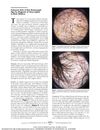 108 citations,
March 2011 in “Archives of Dermatology”
108 citations,
March 2011 in “Archives of Dermatology” Corkscrew hair may be a new sign for quickly diagnosing scalp fungus in black children.
18 citations,
June 2004 in “Mycoses” Two patients with a rare scalp fungus in Poland were successfully treated with griseofulvin and ciclopirox.
[object Object]  18 citations,
May 1988 in “Journal of The American Academy of Dermatology”
18 citations,
May 1988 in “Journal of The American Academy of Dermatology” Itraconazole helps improve tough skin infections but may not prevent them from coming back.
16 citations,
September 2015 in “International Journal of Molecular Sciences” A specific gene variant causes severe skin issues and increases infection risk, requiring careful medical monitoring.
 15 citations,
August 2015 in “Scanning”
15 citations,
August 2015 in “Scanning” Corkscrew and cigarette-ash-shaped hairs in tinea capitis are caused by internal hair degradation and external resistance.
13 citations,
March 2011 in “Acta Paediatrica” Tinea capitis needs systemic treatment to avoid severe outcomes.
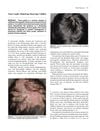 9 citations,
October 2013 in “Pediatric dermatology”
9 citations,
October 2013 in “Pediatric dermatology” Proper antifungal treatment is crucial to avoid misdiagnosis and prevent scarring alopecia.
8 citations,
May 1989 in “Annals of Saudi Medicine” Tinea capitis is common in the Eastern Province of Saudi Arabia and can be effectively treated.
 7 citations,
July 2019 in “The Journal of Dermatology”
7 citations,
July 2019 in “The Journal of Dermatology” Terbinafine effectively treated kerion celsi despite disrupted immune responses.
6 citations,
February 2019 in “Journal of dermatology” Favus, a rare fungal infection, has reappeared in Japan.
 6 citations,
November 1999 in “Mycoses”
6 citations,
November 1999 in “Mycoses” A man in Japan got better from a scalp fungal infection using terbinafine.
6 citations,
October 1998 in “PubMed” Antifungal treatment can improve severe skin infections with cutaneous horns.
5 citations,
November 2010 in “Veterinary Record” The monkeys' skin infection was cured in eight weeks using oral terbinafine, topical washes, and disinfectant fogging.
4 citations,
January 2018 in “Indian dermatology online journal” Trichoscopy helped diagnose and cure a child's hair loss caused by a fungal infection.
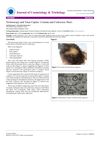 1 citations,
January 2016 in “Journal of cosmetology & trichology”
1 citations,
January 2016 in “Journal of cosmetology & trichology” Trichoscopy helped diagnose and treat a child's fungal scalp infection by spotting specific hair shapes.
1 citations,
November 2009 in “Nurse prescribing” Oral griseofulvin for 6-12 weeks cures most scalp fungal infections in children.
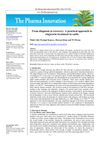 May 2023 in “Pharma innovation”
May 2023 in “Pharma innovation” Ringworm in cattle can be effectively treated with Povidone iodine and Whitefield ointment.
November 2021 in “CRC Press eBooks” Tinea capitis is a fungal infection of the scalp that mainly affects children and can cause symptoms from mild itching to severe inflammation.

A woman and her guinea pig were successfully treated for a fungal infection.
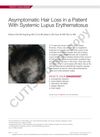
Fungal infections can cause hair loss in lupus patients and should be considered even if rare.
[object Object]  September 2022 in “International journal of infectious diseases”
September 2022 in “International journal of infectious diseases” A woman with a rare scalp infection was cured after one month of medication.
March 2022 in “JAAD case reports” Accurate diagnosis is crucial for effective treatment of hair loss.
August 2019 in “Wiedza Medyczna” Kerion is a severe scalp infection that needs quick treatment to avoid permanent hair loss in children.
 April 2017 in “The journal of investigative dermatology/Journal of investigative dermatology”
April 2017 in “The journal of investigative dermatology/Journal of investigative dermatology” CD101 is highly effective in treating dermatophytosis in guinea pigs.
 April 2014 in “Jurnal Biomedik : JBM”
April 2014 in “Jurnal Biomedik : JBM” An 8-year-old girl had nail and hair issues that improved without specific treatment, but fungal nail infection was hard to cure.
 October 2012 in “CRC Press eBooks”
October 2012 in “CRC Press eBooks” HIV can cause hair loss and changes in nails, which may indicate disease progression.
 September 2024 in “PubMed”
September 2024 in “PubMed” Timely and correct treatment is crucial to prevent complications and scarring in children with scalp ringworm.
51 citations,
May 2008 in “Mycoses” Terbinafine HCl nail solutions with DDAIP HCl are more effective than current treatments for nail infections.
 September 1998 in “Journal of The European Academy of Dermatology and Venereology”
September 1998 in “Journal of The European Academy of Dermatology and Venereology” Phototrichogram helps assess hair loss severity.















